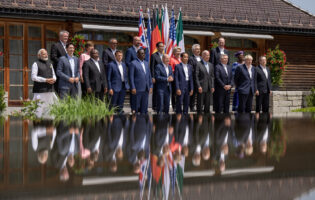A Lost Year? The Relevance of the German Elections on European Stability
On February 12, 2013, AGI hosted a seminar entitled “A Lost Year? The Relevance of the German Elections on European Stability” with Dr. Sebasian Dullien, a Senior Policy Fellow at the European Council on Foreign Relations and Professor of International Economics at HTW, Berlin, the University of Applied Sciences. Dr. Dullien discussed Europe’s current financial status and projected its impact on the upcoming September German elections. He expressed cautious optimism toward Germany’s GDP growth in 2013 and predicted a CDU-SPD Grand Coalition with Chancellor Angela Merkel at the helm.
Europe has weathered the euro crisis storm—for now. European markets experienced a small uptick. The European Central Bank (ECB) instilled confidence in the markets after announcing its willingness to buy bonds. This year, the euro zone can expect what Dr. Dullien calls “fiscal tightening” at around 1.0% of GDP, an improvement from about 1.75% in 2011 and 1.25% in 2012. A decrease in financing costs is a positive growth signal. Rough waters lie ahead, however, as these improvements are far from stable. Countries such as Spain, despite a more promising housing market, can expect an increase in fiscal tightening. Tightening in France and the upcoming Italian elections indicate that uncertainty in Europe lies ahead.
Relative to its neighbors, Germany faired the storm better and arguably benefited from the euro crisis. Investors have moved capital flows from peripheral countries to “safer” German markets. Investment in mortgage-backed securities has strengthened, which is reflected in record-low mortgage interest rates and a 7% overall housing-price increase in 2012. The construction industry has become one of Germany’s core industries, contributing an improvement to the labor market. Current unemployment rates are only slightly above their lowest level since the early 1990s. Regardless of these improvements, challenges remain. German growth will remain weak, hovering around .5% of GDP in 2013.
Politically, this means that there is only limited discontent at the moment. The scenario maximizing the opposition party SPD’s election chances would be for the economy to experience a mild recession under a CDU-controlled government – enough to shake the confidence in Merkel’s management of the crisis, but not enough to scare people away from any changes. The general consensus was that neither situation will unfold as the economy will likely strengthen, however mildly.
While the euro zone ship remains unsteadily afloat, German voters begin to consider which political party can best open the sails of the Germany economy to drive the country forward. Current opinion polls show that 41% of voters favor the CDU, followed by 27% SPD, 13% Greens, and 7% FPD. Assuming outcomes in September will yield similar percentages, neither a CDU-FDP nor a SPD-Green coalition will yield a majority. Due to divergent political platforms, a CDU-Green coalition is unrealistic. A CDU-SPD Grand Coalition, therefore, is probable.
Assuming a Grand Coalition prevails, with Chancellor Merkel at the helm, onlookers can expect a more pro-European government in Germany than in the past years. In an alliance with the SPD, rather than the FDP, Chancellor Merkel will have the freedom to maneuver in a pro-integration direction. Even though the media portrays her as an austerity-loving politician, she is more supportive of European integration and together with the SPD she would have a majority with which she could even change the constitution.
In order for Germany to contribute meaningfully to alleviating the euro crisis, one challenge is to rebalance its own economy. It should simultaneously allow further wage increases and reduce its current account surplus, now larger than China’s. Furthermore, it must reconcile increasing division over how to relieve Cyprus’ debt. After the catastrophic Greek bailout process, the Cyprus debate will create friction and has the potential to change policy dynamics within Germany.
So is 2013 a lost year? This depends how you look at it. Not much in the area of badly-needed institutional reforms for Europe such as a fiscal capacity for the euro zone will happen until the election is decided. However, elections might mark the transition towards a more productive German position and hence a more durable solution of the euro crisis.
Contact







